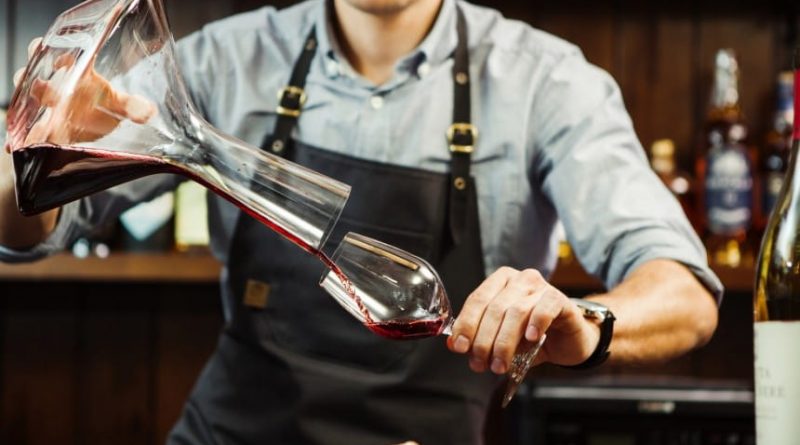Why Should You Decant Wines?
Not every person might be comfortable with a decanter or why you would utilize one. The short answer is that a little air circulation can have a striking effect on the kind of your wine.
Tapping wine is the craft of gradually pouring your wine from its unique container into a glass vessel or decanter. We consider it “craftsmanship” since you want to do it without upsetting the dregs at the base — which is actually quite difficult. Decanters regularly have a simple pour neck and come in all shapes and sizes. The most widely recognized are:
- Swan
- Duck
- Cornett
- Standard
Note that a decanter isn’t as old as a carafe. While both wine-holding vessels will dazzle your visitors, they have various purposes. Glass decanters are intended to work with the air circulation process. Carafes are essentially implied for a better show and simplicity of serving your wine.
Why Decant Wines?
Tapping has various advantages, including isolating the silt from the fluid. This is particularly useful for red wines, which hold the most dregs. Tapping additionally upgrades a wine’s character by presenting it to outside air, and permitting it to relax.
Wines spend a really long time inside the container with no oxygen openness. Air circulation extends every one of the torpid smells and flavors in your wine by delivering amassed gases and mellowing the tannins. However, remember, a lot of oxygen can destroy a decent wine. You should consistently restrict the extra’s openness to the air and keep it cool.
Instructions to Properly Decant Your Wines
Emptying wine, while not troublesome, takes some time and persistence. To be certain you are doing it effectively, follow this aide:
- Start by sitting your jug upstanding for something like 24 hours prior to tapping, particularly in the event that you store your wines on a level plane. Ensure all the silt settles at the lower part of the jug prior to opening it.
- Open the container.
- Gradually slant the container toward the decanter. Continuously keep the lower part of the jug low to hold the silt back from arriving at the neck, and try not to upset the residue.
- Empty the wine into the decanter gradually yet consistently. If the silt begins arriving at the top, quit pouring and slant the jug upstanding to allow it to settle down once more.
- Recork the extra wine inside 18 hours.
To try not to empty residue into the decanter, consistently leave a touch of fluid in the container.
You can empty your wine a few hours before you intend to drink it. Nonetheless, remember that each wine has diverse tapping times. In spite of the fact that there’s little danger of your oxidized wine ruining on the off chance that you intend to drink it inside four hours, be aware of the sort of wine you’re managing.
Is There Such Thing as Over-Decanting?
- In case you’re drinking your wines inside a couple of long periods of emptying them, they will not begin debasing. Be that as it may, be especially cautious with:
- White wines – This sort has more significant levels of thiols than red wines. When over-tapped, they can lose their grapefruit, guava, or passionfruit smells.
- Shimmering wines – Generally, you shouldn’t need to empty a shining wine. Notwithstanding, some may introduce an impactful fragrance that requires dissipating prior to drinking.
- Old wines – Some vintages are sensitive and can rot rapidly whenever they have been opened.
Which Wines Do You Need to Decant?
Practically everything wines can profit from tapping. The air circulation process makes them taste smoother and fruitier. Oxygen openness is particularly useful for more youthful wines with extremely impressive tannins. However, abstain from tapping most shining wines. While air circulation might assist with relaxing the underlying forceful air pocket that comes from opening a Champagne, it is exceptionally simple to smother the air pocket completely.
How Long Should You Decant Your Wines?
As said previously, red vintages may taste better if you dispose of their silt, while more youthful wines could profit from streamlining a smidgen prior to arriving at your taste buds. Notwithstanding, you really want to know precisely how long to air your wines out for ideal outcomes.
Red Wines
Red wines can take anyplace between 20 minutes and two hours to arrive at their fullest likely while emptying. Light-bodied red wines will just need up to 20 to 30 minutes. Some extraordinary models are:
- Gamay
- Grenache
- Zinfandel
- Pinot Noir
Medium-bodied wines, then again, ought to be emptied for 20 minutes to 60 minutes. The most widely recognized models are:
- Merlot
- Malbec
- Tempranillo
- Cabernet Franc
- Barbera
Finally, full-bodied red wines take between one to two hours to empty. Some unequaled top choices include:
- Cabernet Sauvignon
- Petit Sirah
- Monastrell
- Nebbiolo
Most red wines need somewhere around 15 minutes for their reductive characteristics to dissipate. From that point forward, an additional 15 to 30 minutes will make the leftover sharp smells much milder. At the hour-long imprint, the tannins will turn out to be less extraordinary.
White and Rosé Wines
Most white wines and rosés shouldn’t actually be tapped. Be that as it may, if your wine is diminished, tapping will help. If your wine smells abnormal when you open it, it is most likely because of a decrease. This is a normal peculiarity that happens when the sweet-smelling compounds have done without oxygen for a really long time.
You can determine whether your wine is decreased if it needs fragrances or scents like:
- Spoiled eggs
- Consumed elastic
- Garlic
Decreased white wines and rosés need to tap for as long as 30 minutes, albeit 15 minutes ought to be all that anyone could need. If you stand by the perfect measure of time, the fruity aromas will return.




